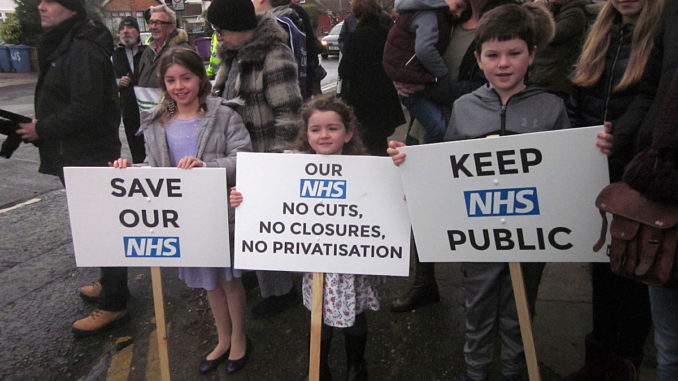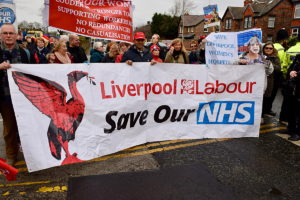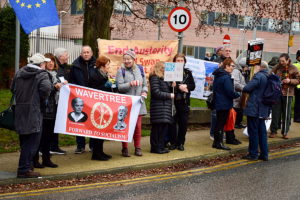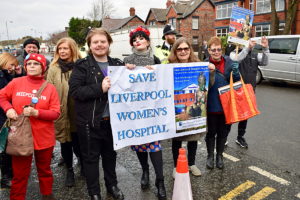
Theresa May’s launch of the NHS Long Term Plan this morning 7 January should fool no-one in Liverpool or anywhere else.
Theresa May was welcomed to Liverpool by Merseyside KONP, Save Liverpool Women’s Hospital campaign and a hundred protestors who gave her a very clear message on her plan.
Despite the mild weather, the Royal Liverpool has been on ‘Red Alert’ at least 25 times since 1 December. Bed occupancy is 92.3%, against a safe level of 85%. In December, 495 ambulances waited over 30 minutes to discharge their patients, and 135 of these waited over 60 minutes. Last week, some patients waited over 3 hours to be seen in A&E, and some in A&E waited 24 hours for a hospital bed.
Why? The half-built Carillion PFI hospital was designed with fewer beds and capacity at the Royal was cut to match the plans. The Trust justified the cuts, claiming that Care in the Community would reduce demand.

May’s plan, written by NHS England Chief Exec Simon Stevens, will replicate this all over England, shifting resources out of hospital, promoting digital technology and telling patients to look after themselves.
Rationing
Last winter, former Health Secretary Jeremy Hunt suddenly postponed all elective (planned) operations to ease the pressure on hospitals. Now, an NHS England document Preparing for 2019/20 Operational Planning and Contracting intends to ensure that ‘as much of [sic] inpatient elective activity occurs in the first half of the year, before winter’.
The document also includes a rationing plan for 17 NHS treatments no longer to be commissioned by CCGs. Trusts are also urged to ‘grow their external (non-NHS) income’ and ‘work towards securing the benchmarked potential for commercial income growth’. They must set up systems to raise money by charging patients for treatment (‘overseas visitor cost recovery’) – a policy recently denounced by several medical Royal Colleges because of its impact on individual and public health.
Long term agenda
The 44 discredited Sustainability and Transformation Plans, re-branded as Integrated Care Systems, will hold the regional budgets to control NHS Trusts. ‘Planning assumptions’ in each STP area are to be agreed by 14 January. Neither the STPs, nor the ICSs, nor the Long Term Plan has been mandated by an Act of Parliament, let alone by patients or healthworkers.
The private sector could gain control of individual ICSs through long term contracts to manage the entire health system within one region.
Real integration of health and social care can only take place when the profit motive is taken out, with care fully-staffed and resourced, publicly accountable, funded through general taxation, and provided free at the point of need.
John Lister, editor of Health Campaigns Together said:
All of the main lines of what has been published or leaked about the Plan are a depressing re-run of previous plans and gimmicks: the only novel proposals are for more central control and less accountability, for trusts to run more like and with private businesses seeking profits, and to raise money by undermining the principles and values of the NHS through charging overseas visitors – a government policy widely condemned by NHS professional staff and campaigners as discriminatory and a step backwards from prevention and public health.
There is no reason to believe this plan, with even less local accountability and no serious plans for public consultation, will prove any more acceptable to the public or successful in implementation than the secretive STPs in 2016 or other previous failed efforts.
Campaigners have yet to see anything to recommend the new plans, or any indication NHS England is willing to come to grips with the crisis fuelled by chronic austerity limits on funding – or demand an end to chaos and fragmentation of the Health & Social Care Act.”
Dr Tony O’Sullivan, KONP co-chair and retired consultant paediatrician, said:
The government has cut £7bn to social care and has underfunded the NHS by £20bn in annual funding over the last 9 years. There is no plan to repair the damage done. Platitudes about prevention and better health are exposed by the £1bn cuts to the public health budget responsible for prevention.
After 9 years undermining mental health, the ‘extra’ now committed is not new money but comes from elsewhere within NHS funding. Theresa May’s assertion that the NHS has never received higher funding is simply not true in relation to NHS funding required to meet need.
Over 210,000 vacancies in NHS and social care and unacceptable stress carried by staff, dangerous waits for A&E, cancer care and surgery, all tell the true story. And the fact that private health providers get 50% of their funds from treating patients diverted from an NHS deprived of the resources to treat them itself exposes the policy direction of government. We cannot accept this situation.’
We will be analysing the NHS Long Term Plan and sharing our more detailed views.
[This is based on press releases by Merseyside KONP and national KONP/Health Campaigns Together.]
Tony O’Sullivan







Join Keep Our NHS Public today!


Leave a Reply